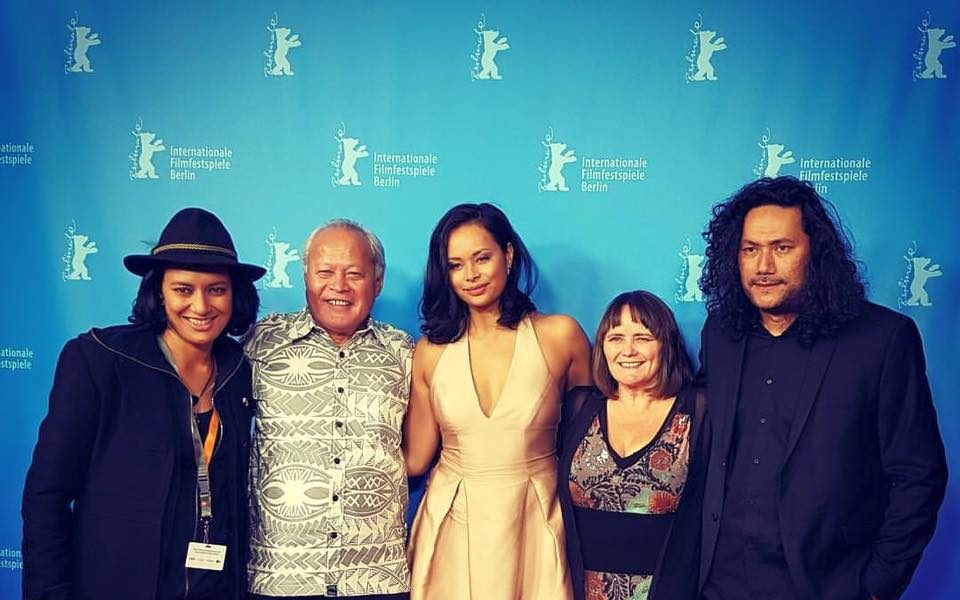One Thousand Ropes: An interview with stars Uelese Petaia and Frankie Adams

One Thousand Ropes is a gripping film about redemption and the relationships that can ultimately lead to a fresh start and had its world premiere at the 2017 Berlin International Film Festival. We sat down with the actors, Uelese Petaia (Maea) and Frankie Adams (Ilisa), to talk about their first reactions to the script and how they envision their characters’ lives after the film ends.
Your performances were both exceptional. What were your initial reactions after reading the script?
Frankie Adams: I had a lot of questions. We all had a lot of questions because of Tusi’s style, he’s such an artist. He is the kind of director who wants to create a conversation and discuss what you took from it. I really enjoyed it. It was quite nostalgic for me because I had never done a script that had a lot of Samoan, that it was the main culture. So I did understand a lot of it. There were parts that are very Samoan, like the spirit. But I had specific questions for Ilisa because she was very special, I wanted to play it with truth and justice for all women.
Uelese Petaia: I was actually scared. I thought that this guy has these demons that we hide. And now he wants to put them out there, and I said to myself, “Do I want to be that person that he uses to do that?” And it was quite easy to say yes. I was on the road, in Australia when they sent me the script. I was dying to do it before they even said come and do this film. These issues were kept hidden for too long, and we need to break that out, get our own people thinking about that. And not just us but other cultures as well, all the people who watch it.
This is a very relatable film.
UP: Yes, it’s a universal issue.
I’m so glad that you both accepted the roles.
FA: I felt honoured that I got it.
How did you both get into the minds of your characters?
FA: Complicated minds.
UP: Yes, yes. You needed to go back to the beginning of your life and look at the different characters you have encountered, and see this guy. But at the same time, you wonder whether these people can actually do that. How can you bring yourself to beat people up and be so cruel? Somewhere along the line [Maea] loses everything, his family, his wife. It’s like karma, it’s coming back to you. And you start to understand and look at this culture where he comes from. It’s such a violent culture, always screaming at each other and yet also very loving and tender. So you just know when this guy’s violent side takes over he’s fighting this demon, trying to push that away. When Ilisa comes back she opens the way for his redemption and creates hope. Particularly when she’s so strong and says how I’m going to look after my daughter and have my baby myself. You’re not going to do that. But it makes you feel good also that she’s taking over the family tradition. He’s sitting there thinking, Yeah I don’t have to do that anymore. She will. I just concentrate on buying baby things for my granddaughter. And working in the bakery, accept this new machine that this woman has brought in.
FA: I’ve had a little anxiety around the mind of Ilisa because I knew she’s a representation of a whole society of women. So I did a lot of research. It wasn’t really the mind that I was concerned about, but I really wanted to understand her heart. Because the thing that I figured in my research was the idea that even though these women find themselves in these relationships, the love is always stronger than the situation. And so I just wanted to understand her heart. I think you understand that love is really what drives a person: she loves her father, she loves her boyfriend but understands that she loves her child more. It was a nice little gateway for me to understand her a bit more. But it was still extremely challenging the whole way. It was challenging in the best way.
Uelese, how was it portraying a midwife with actual pregnant women and newborn babies?
FA: There were a lot of babies.
UP: My grandmother did this when I was growing up, and I used to carry her bag with the oil and pliers and things. I used to sit there and watch her caressing and massaging. When this [project] came out, I thought, Yeah, I know how to do that. But it was also something that I did a lot with my pregnant wife. It was a quite soothing experience as I had done this with my grandmother. I was hoping that those tender moments when doing that would also come through when I was looking after these other women, making them feel comfortable and good. I used to watch [my grandmother] do traditional medicine and some of that stuff I have learned and used when my kids get sick. You just pick the right leaves. You can call on that experience and create.
Now let’s switch from these gentle moments to something more intense. Frankie, how difficult was the shooting of your graveyard scene?
FA: That scene showed a lot of love for her father because she was aware that he was keeping her around at the expense of his health and sanity. I really enjoyed that scene. It was beautiful, and it really showed her strength. I think that you have to be very brave to go into a graveyard at night and eliminate a spirit. That was part of Ilisa’s redemption and it was probably a lighter part of her. It felt like a great release. I just knew that she didn’t want to leave her father in that situation, still facing that demon. I really liked that scene.
UA: Because she was there watching. He couldn’t get the spirit out. He was no longer strong enough.
FA: Yeah, in that scene when he was trying to get Seipua out of the living room, he kind of goes crazy. And she witnesses that. This is overtaking my father and it’s not good for him. If he’s not going to do it, then I’m going to.
What do you imagine Maea and Ilisa’s lives are like after the film ends?
FA: Well, she’s got no more bruises, so that’s a good start. I feel like their relationship is still rebuilding.
UP: I feel it’s growing. And he’s using this relationship with the baby; I reckon he visits every day. It’s an excuse, “Oh, I came to bring something for the baby”. There’s also that opportunity to further enhance the bond that they had. I suspect also that his other daughter sees what is happening and wants to be a part of it, this really new family. They’re very happy. And he is quite content doing his baking, and I don’t think he does healing anymore. I think he has passed it on.
Oh really? I missed that. I thought maybe he would continue.
FA: Well, he passed it on to the fafafingi (modern midwife) because he was incorrectly massaging, which was resulting in all these women having unhealthy pregnancies. But that was probably a release of Maea’s ego. Because he didn’t want to teach him, but it came to a point that he was too injured to do it. Someone must take over.
UP: And then he really wills the daughter to do it herself. You have to do this, you have to do this. And that’s the beginning of this new relationship. They really trust each other now, more than before.
It was fascinating to see the development from the first scene at the kitchen table and their later scenes. What are the next projects that you are working on? Are they somewhat lighter?
FA: I’m actually playing an action girl, a completely opposite character who is a gunnery sergeant. I just finished shooting that. I try and keep the roles as different as possible. Just after I played Ilisa I played a Jehovah’s witness lesbian. I try not to be too typecast, which is exciting. Other than that, I’m not sure. I think I want to do a little more theatre, maybe another film. You know, patience.
UP: I don’t know. I might start a bakery, haha. Nothing on the horizon.
Just relax, you deserve it after such a deep and serious role.
FA: It was. At the moment we are just doing a tour of this film, showing everybody what we did.
Good luck with the rest of the tour. It was a pleasure speaking with you both.
Lindsay Bellinger
Read our review of One Thousand Ropes here.
Read our interview with director Tusi Tamasese here.
For further information about the 67th Berlin Film Festival visit here.
Read more reviews from the festival here.
Watch the trailer for One Thousand Ropes here:


























Facebook
Twitter
Instagram
YouTube
RSS